Photographs: Sanjay Sawant/Rediff.com
General Ehsan Ul Haq, former director of the Inter Services Intelligence, has urged the United States to stop demonising the Lashkar-e-Tayiba and pressuring Pakistan to go after it, saying it's not a priority for the Pakistan army.
In an interaction that followed his speech during a conference on terrorism and major terrorist outfits, Haq, an erstwhile four-star general and ex-chief of army staff, also dismissed the LeT as a major terrorist organisation of any significance, saying its only major offensive was the horrific 26/11 attacks in Mumbai.
"It's not the Lashkar-e-Tayiba that is viciously hitting us, it's the Lashkar-e-Janghvi which is hitting us," he said. "And, it is unfortunate that in Washington, DC, we hear about Lashkar-e-Tayiba, which has been involved in one incident -- the Mumbai incident."
Haq argued, "When it hits the headlines and it is on the agenda for discussions, it is coming from somewhere else, unfortunately."
Reportage: Aziz Haniffa in Washington, DC
'I am somewhat surprised and very disappointed'
Image: A file photo of paramilitary personnel during the 26/11 terror strikePhotographs: Rajesh Karkera/Rediff.com
He noted, "The Lashkar-e-Tayiba has been in existence right from Afghan Jihad days. They switched on to the Kashmiri freedom struggle after that. They were banned by the government of Pakistan in 2001. And its reincarnation under various names has also been banned from time to time."
Haq said, "It is unfortunate that their name was involved in the Mumbai incident and as you are well aware, on whatever evidence was provided, the government of Pakistan has acted very promptly -- the key leaders mentioned by the Indians in the context of the Mumbai incident have been under arrest and their case is in the courts."
And taking a hefty swipe at the Barack Obama administration's counterterrorism officials and US intelligence, Haq asserted, "But let me tell you one or two more things. I am somewhat surprised and very disappointed that Lashkar-e-Tayiba should be projected as an organisation at par with the Al Qaeda."
'A total lack of awareness'
Image: A man uses police tape to cordon off the site of a suicide bomb blast in KarachiPhotographs: Akhtar Soomro/Reuters
"I am telling you this because it shows the total lack of awareness of the situation in our part of the world," he said.
Daniel Benjamin, the Obama administration's coordinator for counterterrorism at the State Department said recently, "Very few things worry me as much as the strength and ambitions of Lashkar-e-Tayiba, which is truly a maligned presence in South Asia."
Benjamin said, "The Lashkar-e-Tayiba has made it clear that it is willing to undertake the bold, mass casualty operations with a target set that would please al Qaeda planners".
Scoffing at such a contention, Haq said, "It (LeT) has been involved in only one incident," and complained that Pakistan "is invariably told that we are supporting them because we are not taking any action against them."
'You would prioritise Al Qaeda here'
Image: A policeman walks through a damaged shrine after it was rocked by an explosion in Pak PattanPhotographs: Faisal Mahmood/Reuters
He said, "A country like Pakistan, which I told you has suffered 30,000 casualties in the last 10 years -- we have been going through a 9/11 every year or more than that -- we have to prioritise."
"You had to prioritise -- the United States -- despite the fact that you have far more resources, you wouldn't treat Al Qaeda at par with Jundallah, which is hitting Iran. You would prioritise Al Qaeda here and I didn't even hear Jundallah's name. Why? Because you are prioritising the one hitting you."
"We must first tackle those who are hitting us and then go after those who are not hitting us but who are terrorists. That is how we view all terrorist organisations. They are terrorist organisations, but we have to prioritise whom to tackle first, given our resource constraints," he said.
'Al Qaeda will be a self-fulfilling prophecy'
Image: Fuel tankers explode after they were attacked on the outskirts of QuettaPhotographs: Reuters
At various other think-tank appearances, Haq has continued to emphasise that the external existential threat that Pakistan faces is India. When asked if he believed that Al Qaeda has a strategy against Pakistan that is separate from its international agenda, he claimed that Al Qaeda was not an existential threat to Pakistan.
"I will frankly admit, I took over as the director general of ISI on the day the bombing of Afghanistan started and I heard the term Al Qaeda and what it actually meant after 9/11," he said.
Haq, who once commanded the 11th Corps of the Pakistani army, which is responsible for the country's defence along the Afghanistan border, recalled, "Right there in 2001, I remember telling my counterparts in the United States and elsewhere, that the way we have started projecting Al Qaeda, and the way we have started ascribing objectives and capabilities and structures to it, it is not a multinational with franchise in every country now, but it will be a self-fulfilling prophecy because we are projecting it that way. And, that's exactly what happened over the last nine years."
'Al Qaeda continues to thrive'
Image: Men carry coffins of victims who were killed in a bomb blast in LahorePhotographs: Mohsin Raza/Reuters
He said his view was that for all the descriptions of Al Qaeda Inc, the terrorist organisation led by Osama bin Laden was "far more diffused, it is far more disorganised in many ways. But the common linkage has been ideology. That is where the centre of gravity resides."
"Despite losing all that leadership, it continues to thrive because we haven't done anything about the ideology. The alternate narrative part hasn't happened," said Haq.
He argued, "When it comes to Pakistan, I feel on the one hand, we are saying that Al Qaeda is down to less than a 100 in Afghanistan, and a couple of hundred in Pakistan. And yet, we ascribe to them capabilities and agendas and objectives and missions, which even a well organised military structure may fail to work out for itself."

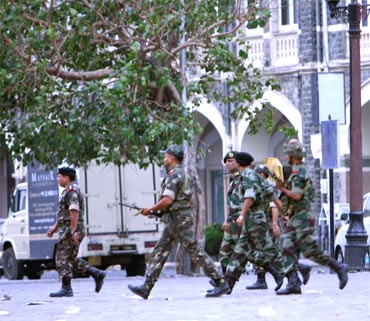
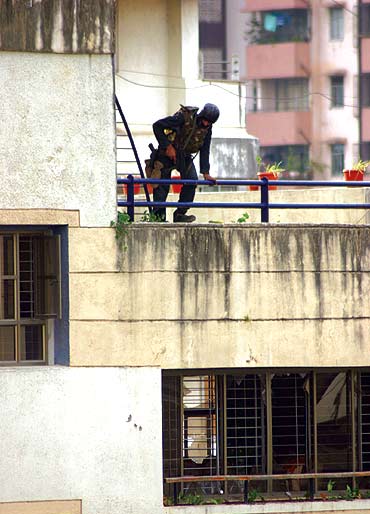
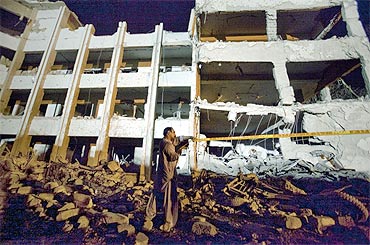
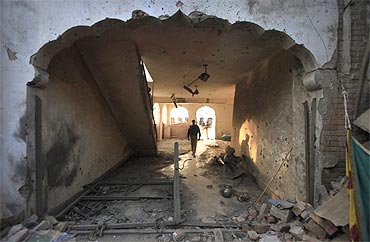

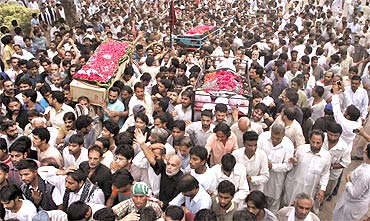
article